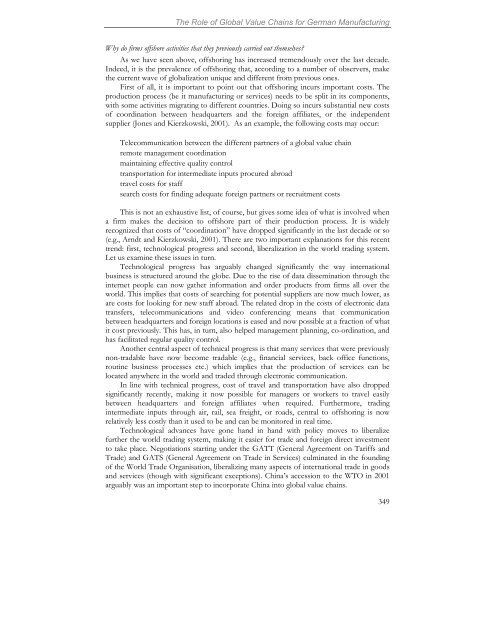The Role of Global Value Chains for German Manufacturing
The Role of Global Value Chains for German Manufacturing
The Role of Global Value Chains for German Manufacturing
Create successful ePaper yourself
Turn your PDF publications into a flip-book with our unique Google optimized e-Paper software.
<strong>The</strong> <strong>Role</strong> <strong>of</strong> <strong>Global</strong> <strong>Value</strong> <strong>Chains</strong> <strong>for</strong> <strong>German</strong> <strong>Manufacturing</strong><br />
Why do firms <strong>of</strong>fshore activities that they previously carried out themselves?<br />
As we have seen above, <strong>of</strong>fshoring has increased tremendously over the last decade.<br />
Indeed, it is the prevalence <strong>of</strong> <strong>of</strong>fshoring that, according to a number <strong>of</strong> observers, make<br />
the current wave <strong>of</strong> globalization unique and different from previous ones.<br />
First <strong>of</strong> all, it is important to point out that <strong>of</strong>fshoring incurs important costs. <strong>The</strong><br />
production process (be it manufacturing or services) needs to be split in its components,<br />
with some activities migrating to different countries. Doing so incurs substantial new costs<br />
<strong>of</strong> coordination between headquarters and the <strong>for</strong>eign affiliates, or the independent<br />
supplier (Jones and Kierzkowski, 2001). As an example, the following costs may occur:<br />
Telecommunication between the different partners <strong>of</strong> a global value chain<br />
remote management coordination<br />
maintaining effective quality control<br />
transportation <strong>for</strong> intermediate inputs procured abroad<br />
travel costs <strong>for</strong> staff<br />
search costs <strong>for</strong> finding adequate <strong>for</strong>eign partners or recruitment costs<br />
This is not an exhaustive list, <strong>of</strong> course, but gives some idea <strong>of</strong> what is involved when<br />
a firm makes the decision to <strong>of</strong>fshore part <strong>of</strong> their production process. It is widely<br />
recognized that costs <strong>of</strong> “coordination” have dropped significantly in the last decade or so<br />
(e.g., Arndt and Kierzkowski, 2001). <strong>The</strong>re are two important explanations <strong>for</strong> this recent<br />
trend: first, technological progress and second, liberalization in the world trading system.<br />
Let us examine these issues in turn.<br />
Technological progress has arguably changed significantly the way international<br />
business is structured around the globe. Due to the rise <strong>of</strong> data dissemination through the<br />
internet people can now gather in<strong>for</strong>mation and order products from firms all over the<br />
world. This implies that costs <strong>of</strong> searching <strong>for</strong> potential suppliers are now much lower, as<br />
are costs <strong>for</strong> looking <strong>for</strong> new staff abroad. <strong>The</strong> related drop in the costs <strong>of</strong> electronic data<br />
transfers, telecommunications and video conferencing means that communication<br />
between headquarters and <strong>for</strong>eign locations is eased and now possible at a fraction <strong>of</strong> what<br />
it cost previously. This has, in turn, also helped management planning, co-ordination, and<br />
has facilitated regular quality control.<br />
Another central aspect <strong>of</strong> technical progress is that many services that were previously<br />
non-tradable have now become tradable (e.g., financial services, back <strong>of</strong>fice functions,<br />
routine business processes etc.) which implies that the production <strong>of</strong> services can be<br />
located anywhere in the world and traded through electronic communication.<br />
In line with technical progress, cost <strong>of</strong> travel and transportation have also dropped<br />
significantly recently, making it now possible <strong>for</strong> managers or workers to travel easily<br />
between headquarters and <strong>for</strong>eign affiliates when required. Furthermore, trading<br />
intermediate inputs through air, rail, sea freight, or roads, central to <strong>of</strong>fshoring is now<br />
relatively less costly than it used to be and can be monitored in real time.<br />
Technological advances have gone hand in hand with policy moves to liberalize<br />
further the world trading system, making it easier <strong>for</strong> trade and <strong>for</strong>eign direct investment<br />
to take place. Negotiations starting under the GATT (General Agreement on Tariffs and<br />
Trade) and GATS (General Agreement on Trade in Services) culminated in the founding<br />
<strong>of</strong> the World Trade Organisation, liberalizing many aspects <strong>of</strong> international trade in goods<br />
and services (though with significant exceptions). China’s accession to the WTO in 2001<br />
arguably was an important step to incorporate China into global value chains.<br />
349









